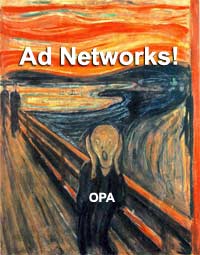 Industry trade group, Online Publishers Association (OPA), has discovered that media is more effective on premium content sites than on auto-generated, splogs created in Ukraine.
Industry trade group, Online Publishers Association (OPA), has discovered that media is more effective on premium content sites than on auto-generated, splogs created in Ukraine.
But, wait. There’s more!
In today’s MediaPost, Gavin O’Malley speaks with Pam Horan, president of the OPA, about the second of two studies funded by OPA using Dynamic Logic MarketNorms data called “Improving Ad Performance Online.” In the first study, which you can download from the OPA site here, readers discovered that premium content is important for advertisers. With study #2, readers learn the same treat except this time it’s “in spite of the economic downturn.”
We like that OPA does DL studies. It would be nice if they did something more insightful, hard-hitting, useful. Can anyone really see agency or exchange media buyers using this data as reasons to purchase from a premium publisher?
The real targets of the studies appear to be ad networks who are seen as siphoning off direct business such as Specific Media‘s rumored huge deal with an automaker in 2008 where the automaker decided to go to an ad network with reach and scale rather than pay premium prices of the content sites.
Ironically, publishers are the ones enabling ad networks by providing the inventory. And the inventory is often from publishers of premium content sites.
My mother, my sister. My mother, my sister.
Where does the ad exchange fit in here?
In the near term, the advertising exchange is here to provide a marketplace for unsold inventory that a premium content site’s direct sales team cannot sell. For media buyers, ad exchanges provide the scale and reach of an ad network and adds transparency which breeds efficiency – which improves ROI.
Long term, smaller, publisher direct sales teams will be focused on integrated sponsorships, and more and more premium inventory will be sold in the exchange model as advertisers and publishers realize cost efficiencies and liquidity improves. Yes, sales teams get smaller, but new opportunities open up for ad traders on behalf of the publisher.
There is no question that advertisers will be playing all sides of the fence for the foreseeable future as exchanges’, networks’ and content sites’ pricing fluctuates in the chase for the almighty ad dollar.
One omission from this study is, logically, long tail niche content sites. After all, this study is funded by large, OPA web publishers. Long tail, niche content sites are ALL premium content sites for the right advertiser and these sites nearly always do not have direct sales teams. Their target audience can be very valuable for a nimble advertiser on the exchange.










